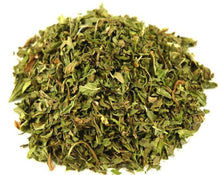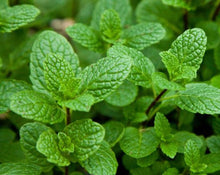Mint Tea great for Nausea Relief
Mint Leaf - Mentha piperita L.
Origin: Brazil
Used part: Leaf
Description:
The mint (Mentha spicata) is an aromatic herb with characteristic and pleasant smell and intense flavor. It is very popular and widely used in cooking as a seasoning, to make juices, drinks and compose salads. This mint, also known as mint-green, is native to Asia and has thick, rounded leaves. However, there are many species of spearmint, and it is very difficult to identify all of them. Another very common is peppermint, which is more burnt and has longer and thinner leaves. Tea is one of the most consumed forms of the plant and is made by infusing its leaves. Due to its medicinal properties, mint tea can provide several health benefits and maintenance of our well-being.
Health benefits:
The antispasmodic effect is related to the plant's ability to treat muscle spasms, soothing and neutralizing involuntary muscle contractions. Therefore, it is optimal for liver, kidney and uterine colic in the case of women. It also has an antiemetic effect, relieving nausea and vomiting and decreases heartburn, activating the production of bile and improving the digestive system. It functions as a vasodilator, activating circulation; has a calming effect and acts as an antiseptic, making it difficult to grow bacteria and worms.
In addition, mint is rich in vitamins A and C, and minerals such as iron, calcium, phosphorus and potassium, with antioxidant and immune-stimulating properties. It also contains ascorbic acid, menthol and tinol in its composition, providing an expectorant and decongestant action.
Good Herbal Remedy:
- Relieve digestive alterations, as this plant has anti-spasmodic effect, capable of decreasing intestinal cramps and digestive alterations, and anti-emetic, relieving nausea and vomiting
- Facilitate digestion and decrease heartburn by activating the production of bile and improving the function of the digestive system
- Help relieve fever, especially when associated with ginger as it stimulates circulation
- To combat the headache, being vasodilator and able to activate the circulation
- Decrease stress, anxiety and agitation symptoms by having calming effects
- Act as an antiseptic, capable of hindering the growth of bacteria and amoebas in the digestive tract
- Help treat colds and flu, as it contains ascorbic acid, menthol and tinol in its composition, having an expectorant action and decongestant
Directions:
Making tea with the mint leaves is simple: put about 8 to 10 mint leaves, properly sanitized, in 300ml of boiling water. Turn the heat off, lower for 30 minutes and strain. Then take it in the natural way, without sugar or sweetener.
How to drink:Take 2 to 3 times a day.
Contraindications:
Mint should be avoided by people with severe reflux or hiatus hernia, in addition to pregnant women, breast-feeding women and children under 5 years. Side effects of mint may include changes in bowel rhythm, such as diarrhea or constipation, or allergy reactions, with symptoms such as redness, itching, and hives on the skin.




